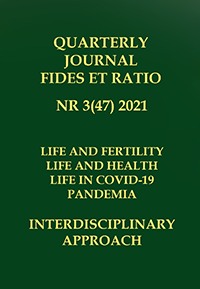Abstract
In some countries, one of the most difficult bioethical challenges of the SARS-CoV-2 coronavirus pandemic has been a sharp rise in the number of chemical abortions performed in hospitals, outpatient clinics, or at home. Limited access to medical services at public and private healthcare facilities and the development of telemedicine have resulted in the practice of chemical abortion having largely moved from hospitals and clinics to the home. Chemical abortion is a method used only in the early stages of pregnancy, i.e. up to 7-9 weeks. The first stage of abortion involves taking RU-486, a pill containing a preparation called Mifepristone which kills the newly conceived life in the mother’s womb. The second stage of chemical abortion involves the use of a preparation called Misoprostol, which leads to the expulsion of the dead embryo from the woman’s body.
The main goal of the article is to analyze the ethical and legal dispute in Italy in the years 2020 and 2021 concerning new ways of using the abortion pill RU-486. In August 2020, the Italian Ministry of Health decided that chemical abortion – performed using the medical preparation RU-486 – should not be practiced at hospital gynecological and obstetric wards, but in day hospitals, without the requirement of hospitalization for women performing such abortions. Analyses carried out in the article show that chemical abortion not only kills the life of a human embryo, but in some cases may also be dangerous to the life and health of the mother. The liberalization of chemical abortion in Italy has led to an increase in the number of unborn children who are aborted, as it facilitates access to this type of abortion and makes it a procedure that is largely self-administered at home. The Italian dispute over home abortion and the RU-486 pill is linked to other serious bioethical debates that are currently taking place in many countries around the world
References
Dzwonkowska, D. (2020). Environmental Vices as Ethical and Anthropological Roots of the Environmental Crisis, Studia Ecologiae et Bioethicae, 18 (5), 171-180, https://doi.org/10.21697/seb.2020.18.5.15.
Klein, R., Raymond, J., Dumble, L. (2013). RU 486: Misconceptions, Myths and Morals, North Geelong: Spinifex Press 2013.
Kobyliński, A. (2017). Bezpieczna aborcja? Etyczne aspekty stosowania pigułki aborcyjnej RU-486, Studia Ecologiae et Bioethicae, 15 (4), 79-89, https://doi.org/10.21697/seb.2017.15.4.08.
Kobyliński, A. (2018). Aborcja chemiczna w domu? Nowa forma stosowania pigułki aborcyjnej RU-486 we Włoszech, Studia Ecologiae et Bioethicae, 16 (1), 15-36, https://doi.org/10.21697/seb.2018.16.1.02.
Kobyliński, A. (2020). The Philosophical Arguments in the Dispute over Artificial Reproduction in Italy in the Years 2004-2014, Studia Ecologiae et Bioethicae, 18 (5), 143- 154, https://doi.org/10.21697/seb.2020.18.5.13.
Kućko, W. (2019). Dylematy etyczne dotyczące badań prenatalnych prowadzonych w Polsce, Teologia i Moralność, 14(1), 121-138, https://doi.org/10.14746/tim.2019.25.1.8.
Kućko, W. (2020). W służbie społeczeństwu i rodzinie – współczesne ujęcia etyki farmaceutów, (in:) W. Nowak, K. Szalonka (red.), Zdrowie i style życia. Determinanty długości życia, 297-313, Wrocław: E-Wydawnictwo. Prawnicza i Ekonomiczna Biblioteka Cyfrowa, http://doi.org/10.34616/23.20.123.
Lattarulo, P. (2021). Bioetica e dentologia professionale, Columbus: McGraw-Hill Education. Morresi, A., Roccella, E. (2010). La favola dell’aborto facile. Miti e realtà della pillola RU-486, Milano: Franco Angeli Edizioni.
Morresi, A., Roccella, E. (2020). Aborto anche nei consultori? Ma così si va oltre la legge 194, Avvenire, 195, 8.
Negrotti, E. (2020). Così si lasciano le donne sole, Avvenire, 189, 7.
Noia, G. (2020). La salute delle donne e i rischi della RU-486, L’Osservatore Romano, CLX (188), 3.
Ognibene, F. (2020). La RU-486, una conquista? Così si ignora il concepito, Avvenire, 208, 12. Poggio, D. (2020). Strappo sull’aborto (in un tweet), Avvenire, 189, 6.
Pontifical Academy for Life, (2020). Note About the Announcement of New Guidelines On Pharmacological Abortion in Italy: http://www.academyforlife.va/content/pav/en/the-academy/activity- academy/note-guidelines-on-pharmacological-abortion-in-italy.html (Access: 21.06.2021).
Refolo, P., Sacchini, D., Spagnolo, A.G. (2020). Pandemic emergency triage: about the risks of a trolleyology, Medicina e Morale, 69 (4), 471-482, https://doi.org/10.4081/mem.2020.852.
Rotili, S. (2020). COVID-19 Legacy. SARS-CoV-2 clinical trials, vaccines trials and bioethics, Milano: Streetlib.
Sartea, A. (2020). EllaOne „libera”, farmacisti in allarme, Avvenire, 293, 21.
Scandroglio, T. (2021). Aborto, 40 anni dopo: una sconfitta che interroga l’oggi, La Nuova Bussola Quaotidiana, 17.05.2021: https://www.lanuovabq.it/it/aborto-40-anni-dopo- una-sconfitta-che-interroga-loggi (Access: 21.06.2021).
Spagnolo, A.G. (2020a). RU486: è solo una questione medico-farmacologica? Medicina e Morale, 69 (3), 275-279, https://doi.org/10.4081/mem.2020.702.
Spagnolo, A.G. (2020b). Safety and bioethics in the days of COVID-19. Medicina e Morale, 69(1), 5-9, https://doi.org/10.4081/mem.2020.604.
Verlicchi, D. (2020). Tra dolore e solitudine il mio aborto con la pillola, Avvenire, 191, 12.
Waleszczyński, A. (2019). Między troską a sprawiedliwością – Virginii Held poglądy na wspólnotę polityczną, Roczniki Filozoficzne, 67 (3), 115-135, https://doi.org/10.18290/rf.2019.67.3-6.
Zambrano, A. (2020). Segreti e verità taciute sui rischi della pillola killer: il ministro sapeva, La Nuova Bussola Quotidiana, 11.08.2020: https://www.lanuovabq.it/it/segreti-e- verita-taciute-sui-rischi-della-pillola-killer-il-ministro-sapeva (Access: 21.06.2021).

